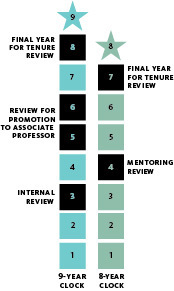 loading
loading
Light & VerityWait for tenure review may get shorterYale brings its tenure process into line with those of its peers.  Mark Zurolo ’01MFAView full imageFor a junior faculty member at Yale, the waiting can be the hardest part. The Faculty of Arts and Sciences reformed its famously long tenure process in 2007, shortening the timeline for tenure reviews from ten years to nine—that is, a tenure review in the eighth year and, if it’s successful, awarding of tenure in the ninth. Still, Yale’s timeline is longer than those of other elite schools. Harvard and Stanford have eight-year tenure clocks, and Princeton’s is seven years. But Yale will no longer be the outlier if, as expected, the Corporation adopts new changes approved by the faculty in September. Under the new plan, junior faculty would get a tenure review by their seventh year and receive tenure in their eighth year. FAS dean Tamar Gendler ’87 says the change—along with others that bring Yale’s process into line with its peers—is necessary to attract and keep the best faculty. “We were failing to attract some talented faculty who were put off by the long and idiosyncratically structured tenure clock,” says Gendler, “but more significantly, we were losing some of our most talented faculty to other schools after their fourth or fifth year.” The new plan eliminates an intermediate pre-tenure step: promotion from assistant professor to associate professor without tenure.* Yale is one of only a handful of US universities that have such a promotion; it involves a time-consuming review and, says Gendler, “creates serious bad will” with faculty at other institutions who are asked to spend time evaluating candidates for a non-tenured position.* Also, to help junior faculty assess their progress and their chances of being tenured at Yale, a “mentoring review” will be added in the fourth year. * This sentence was edited for clarity in the online edition.
The comment period has expired.
|
|